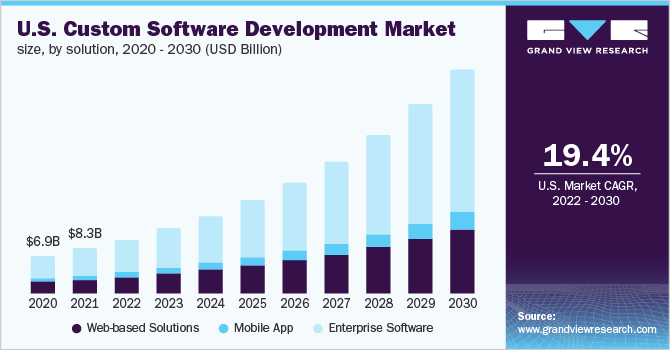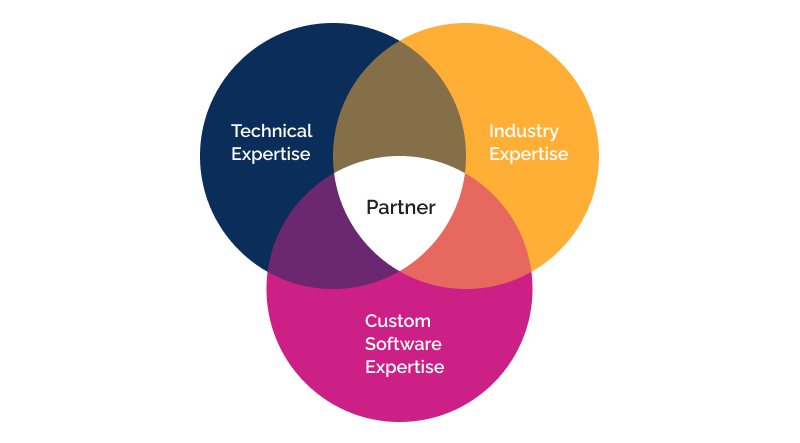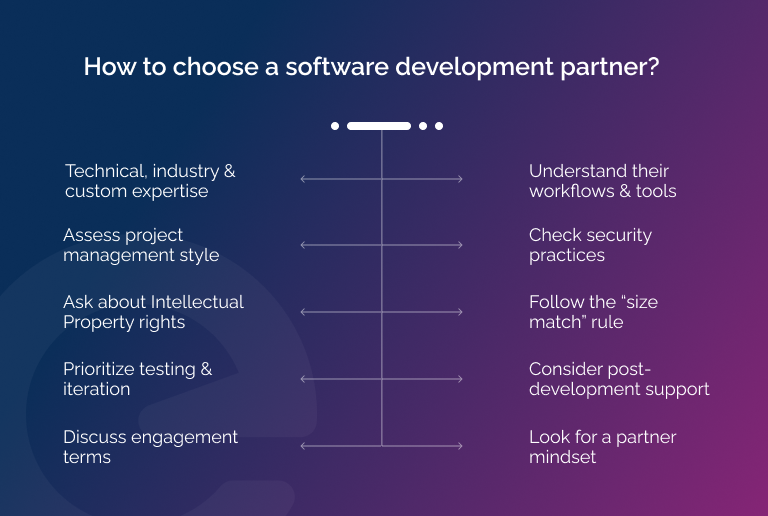As a decision-maker in tech, you`re probably under a lot of pressure. The stakes are even higher with custom software, which needs to fit your business to a tee. With over 28,000 custom software development companies on Clutch alone, how do you choose the best match without spending years researching options?
The Internet is filled with software development horror stories. From unprofessional vendors pilling up hidden costs on their clients to development teams changing several times throughout a project or going severely over budget.
By following a set of criteria to validate companies you can speed up your search and make sure your outsourcing experience doesn't end in disaster. In this article, we've put together some of the key elements that set top-performing custom development companies apart from the rest.
How can custom software development give your business that extra edge?
The custom software development process is a long-term relationship. Because you are building something that is unique to your needs, goals, and users, you want to avoid changing providers often. Consider the process of finding and settling on a software development company as an integral part of your business strategy, right up there with other essential KPIs and metrics.
While they might seem like a quick fix, off-the-shelf solutions rarely provide the processing power, storage, or scalability needed as your business grows. And even if they are, it would be at an exponential price. What starts out as a cheap option, ends up incredibly expensive as you keep adding users, high-volume transactions, or services.
Even if ready-made solutions seem convenient, custom software development still remains one of the main competitive advantages companies have in an overcrowded market.
Access to third-party resources, expertise, and support
By partnering with a custom software development company you get access to a wider range of resources and support than most companies can afford in-house. You can also tap into the expertise of people who worked across multiple projects and technologies and use those insights to your advantage. The best ideas usually come from people coming together and sharing their diverse experiences.
Tailored software products
Custom application development allows companies to stay ahead of the competition by creating software products that address previously overlooked user needs. In the United States alone, the custom software development market is expected to grow at an annual rate of 19.4% by 2030, with enterprise software leading the way. The demand for custom software comes precisely from the competitive edge it offers. By creating tailor-made solutions, companies can add new and unexpected features or integrate with existing systems in a more efficient way than other products on the market do.

Better scalability, security, and compliance
Custom software is built to accommodate growth and scalability from the start. It also allows businesses to implement additional security measures that off-the-shelf solutions don`t cover, from very specialized access control to network security. Because it's tailored to industry requirements, custom software makes it easier to stay compliant with industry regulations and avoid hefty fines.
Finding custom software development services providers
Before starting your search, you should have a general idea of your requirements and what you plan to build. Don`t worry, you don't need to have everything defined at this stage.
In fact, most custom development companies offer product discovery services where you will get the chance to validate and refine specs. However, having a simple list of objectives makes it easier to decide if companies you find are a good fit in terms of expertise.
Some things you`ll want to look into may include:
-
What are the specific roles and responsibilities you need within your team? For example, do you plan to oversee the project or do you want to bring a Project Manager on board?
-
Do you plan to use a particular tech stack? How complex is your application?
-
What are your timeframe, biggest milestones, and preferred budget?
-
What is your preferred communication method and how often do you want to receive status updates?
After outlining requirements, the first step is to create a long list of software development companies. There are plenty of ways you can go about conducting your online research.
Ratings & reviews directories
Platforms like Clutch, GoodFirms, or DesignRush can give you a good overview of a development company`s activity. You can review their profile to check the services they offer and completed projects, as well as client reviews and testimonials.
Some of these platforms also feature curated lists of software development companies based on criteria like location, technologies, or services. Combined with filtering options like project size or average hourly rate, you can use these lists to focus your search.

Google research
Use keywords associated with your business to search the web for software development companies that fit your requirements.
For example, you can search for “fintech development companies” or “fintech development companies specialized in machine learning” to get a sense of the available organic and paid results.
Or if you are not sure about the specifics yet, you can go for more general search terms, like “software development company”.
Technology publications, blogs, and social media
A good software development company is a master of their craft. This means they can write about development in a clear and interesting way and they contribute to the community with articles, guides, and useful content.
Stay up to date with technology publications and blogs and see if any piece of content catches your eye. It might be from your next development partner.
Choosing the right software development company
Now that you have enough information and a long list of potential companies, it's time to narrow it down. A strong portfolio of projects and services, positive client testimonials, and useful content are definitely important, but they are not enough to create powerful custom software.
Here are 10 essential aspects to keep in mind when building your shortlist of the best custom development companies for your software project.
1. Look for these 3 types of expertise
Expertise is a crucial factor when evaluating software vendors, but their competencies must be tailored to your business and application. For the vendor to be a good fit, it must provide three kinds of expertise:
-
Technical expertise - if you are looking for Android app development, then you should review companies focusing on Android. Like with many things, quality trumps quantity. Avoid companies that work with any and all tech stacks. Choose vendors that are certified in your technology of choice or have a track record of successful projects built with it (if they are launched and publicly available, you can even test some of the applications listed in their portfolio).
-
Industry expertise - custom software is all about gaining a competitive edge in the market. It's very hard to do that if the development company you are working with is not familiar with your industry. Working with domain experts guarantees your software is compliant with industry regulations. But more than that, it helps you deliver features faster and leverage domain knowledge to create innovative solutions.
-
Custom application development expertise - building a complex application is not the same as building a website or coding a plugin. Software vendors need to have clear processes and an end-to-end software product development approach, including pre-launch check-ups and post-launch maintenance and support. Their development methodology should be focused on the particularities and challenges that come with custom software.

2. Understand their workflows & tools
Processes and tools are the bread and butter of software development, they will be the building blocks of your application.
Learn how the vendor works and what approach they use, be it Scrum, Rapid Application Development, or other Agile methodology.
How often do they deploy code?
Do they use automation or other tools to streamline their development workflow?
AI-powered tools and coding assistants are becoming increasingly popular as a way to boost development productivity and efficiency. The company you choose should have a strong desire to keep up to date with the latest technologies, including internal tools and methodologies.
3. Assess their project management style
Custom software development involves a lot of steps and teamwork, from validating requirements to preparing for launch. Being able to communicate efficiently with your development partner throughout this whole process is essential for success.
Choose a software development company that values transparency, provides regular status updates, and involves you in the decision-making process.
Their project management style should be hands-on and focused on keeping communication channels open at all times, including delivering regular demos if needed and exchanging feedback early and often.
Check how the team manages their development workflow, from daily stand-ups to sprint retrospectives, and the project management tools they use.
4. Check security practices
Working with a software development company means you will likely share a lot of sensitive data with them. Before entrusting them with this information, you need to check their security practices at all levels: how do they secure software against cyber threats, and how do they handle confidential materials and ideas?
Cybersecurity practices - check if the company is compliant with data protection regulations and what type of cybersecurity services they offer (e.g. Managed Threat Response, Compliance & vCISO, Penetration Testing, etc.). Data breaches and ransomware attacks can have devastating consequences on a business's reputation and finances. Make sure the vendor you choose handles security end to end and has a solid strategy to define threat scenarios and prioritize them according to a risk scale.
Confidentiality practices - Non-Disclosure Agreements (NDAs) and Non-Compete Agreements (NCAs) protect your trade secrets, product ideas, and confidential materials against prying eyes. Ask about these measures before signing a contract with a software development company to ensure sensitive information is handled appropriately.
5. Ask about IP rights
Intellectual Property (IP) rights are the main way you can safeguard your concept and ideas. When partnering with a development company, it's imperative they transfer you the full rights to your product.
This is not just a legal requirement, but it's also a strategic and financial necessity. Otherwise, you won't be able to monetize your product through licensing agreements or royalties.
6. Follow the “size match” rule
You want to make sure both the company and the team size are a good fit for you.
The “size match” rule assumes that companies and teams with the same size are more likely to share similar working styles and capacities. This means you are less likely to get frustrated because the development company doesn't have the resources to match your rhythm and goals.
However, don't follow the rules blindly. Bigger companies and teams aren't automatically better, just as smaller ones won't automatically treat you as their most important customer. Take into account size, but also look at the maturity of the company and the complexity of the projects they worked on.
7. Prioritize testing and iteration
One of the worst feelings as a client is to watch your software glitch or freeze in a demo meeting. Testing and iteration are vital aspects of building resilient custom applications.
Before committing to a development company, you need to understand what the testing, acceptance, and feedback phase looks like for them.
What type of testing do they conduct?
What methodologies do they use?
Without testing there can be no improvement. The degree to which they conduct testing is also the degree to which they are willing to learn and improve.
8. Consider post-development support
Development doesn't just stop when you launch your application. You don't want to find yourself battling tickets and angry emails, so support and maintenance should also be discussed and negotiated.
Ask your potential partners if these services are included in the contract and for how long they will provide them after the launch.
Post-development support is not only about keeping disruptions at a minimum. It's also a way to keep your application up-to-date from a technical standpoint and incorporate valuable user feedback.
9. Discuss engagement terms
The type of engagement you choose will significantly influence the terms of collaboration, so you need to find the right fit for you.
For example, in a managed services model, the software vendor takes full responsibility for the development, maintenance, and support of the application. This approach is ideal for companies who want a complete, end-to-end solution without having to manage any in-house resources.
In a co-sourcing model, companies bring in external help to augment their development team, usually because they lack those niche skills.
10. Look for a partner mindset
Technical expertise is just the surface-level requirement for building successful software products. Look for a development company with a partner mindset, who can think strategically and come up with solutions that address your real business needs and pain points.
Your development partner should not only advise you on technical aspects but they should also be invested in your growth.
For example, does the development company offer consulting services?
Do they include Business Analysts in their team?
Does the development company have any experience in building their own software products?

Conclusion
Decision-makers in the tech industry are faced with constant challenges. One of the most stressful factors they face today is unpredictability, both within their organization and outside. Bringing on board a software development partner comes with its own level of unpredictability and risk.
However, it doesn't have to be a leap of faith or a years-long process of background checks. Using a list of criteria like the ones mentioned in this article can help you speed up your search, while also keeping your stress levels at bay.








